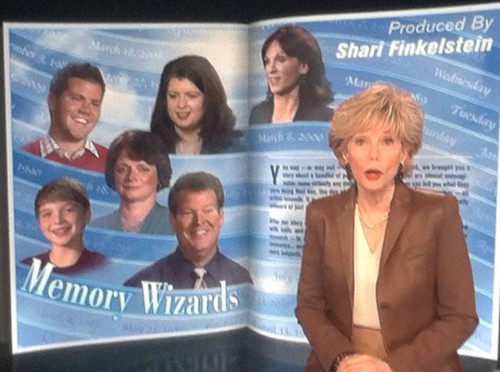Imagine if you were able to remember every day in all of your life. In seconds you could recall everything you did on a specific day. Instantly, you would see vivid images in your mind of events that took place that day and even be able to remember specific conversations. If anyone said they had these abilities 10 years ago, people would simply laugh at them. But today those people are starting to realize how wrong they were.
With research in the memory of the human mind progressing in recent years, scientists from the University of California in Irvine have discovered that there are in fact people who have an extraordinary memory of a caliber never documented before.
The condition and ability is called HSAM, which stands for “highly superior autobiographical memory” and has been identified over the last five to 10 years.
Only around 30 people in the world have been diagnosed with this incredible ability. One of these people is Tracy Fersan, the international student advisor at Suffolk University. Fersan helps hundreds of international students at Suffolk every day and remembers every single one of them.
“Initially they only thought there was five or six people in the world, but now its more like 30 or 40 people in the world,” said Fersan on her ability. “I think more people will step forward and they will realize that it is not as uncommon as they thought it was.”
Fersan always knew about her great memory, but she never thought it was a scientific phenomenon that other people were blessed with as well.

(Photo courtesy of Tracy Fersan)
“My friends and family have always realized that I remembered dates, birthdays and anniversaries. I can’t tell you how many times I have started a sentence with: do you know what you were doing a year ago today? I was first aware of it when I was around 10 or 12 years old, but none of it really made sense before Jan. 28, 2009,” Fersan said, showing how she remembers specific dates and what exactly happened on the day.
“It was a snow day. I was home. I was working as a teacher five years ago. Five years ago, tomorrow. I saw an article on Yahoo! about a woman who could remember every single day of her life and she didn’t really seem that happy on the picture, but I read the article and it indicated that the University of California Irvine was doing research on memory. So I wrote to them and said, ‘it kind of sounds like me and I would be interested in testing.’ So they reached back to me a couple months later and I started testing in February 2010. I have been doing research for them for about four years now. Every three or six months they call me and say, are you ready for another test?”
60 Minutes originally did a story on HSAM in December 2010 and then did a follow-up story in 2013 – a story that aired on Jan. 12, 2014. Five people with HSAM were on the show, including Fersan, who in September 2013 was contacted by the University of California in Irvine as 60 Minutes was interested in doing the follow-up story.
“Part of the [testing process] was that we were all given MRI’s, and the tests showed that there is definitely more white matter in a certain part of the brain so that is an easier access to information going back and forth” said Fersan.
“The research shows that within a day or week, we are all the same like anybody else, it’s when we start really going back in time, that we can really make a difference. For instance, when I went out and tested on the camera they asked me, what was the day the Monica Lewinski scandal broke? And I said Jan. 25, 1998. Another question was what happened on Sept. 6, 1997, what was the big event? Questions like that.”
Even though the test experience was exciting, it could not compare to being on the actual 60 Minutes show hosted by legendary journalist Lesley Stahl. Not a lot of people in the world get the honor of being on this show.Now Fersan is one of them.
“The experience was amazing, the producers were incredible. Jenny and Sherri were both very helpful and very polite. We all still keep in touch. Lesley was a classmate of my mother here in Swampscott, Mass. I met her 20 years ago and when we had to introduce ourselves she said: get your cellphone, let’s call your mother!”
“Leslie was incredible, classy, nice, really great questions, she was fun and two and a half hours just went by in a heartbeat. She was so nice,” Ferson said.
There is no doubt that Fersan’s ability has a positive side to it, but sometimes it is also a burden, she said.
“I look back and I can identify a lot of happy memories, but I also know when the sad days are. There is also a downside to this ability. Out of the people they have been studying only a few of us have children and I’m one of them. Most of them are single. And that when you ask the question, is it a good thing to have or not? Can you let go of grudges? If you remember everything, how does that affect your relationship? Can you have a fight and move on?”
Fersan says that it is not something she can just turn off if she wants to. This ability is part of her identity and she would never want to give it up for anything in the world.
Fersan’s ability enables her to look at every day as if it has its own unique identity and this certainly not how most of us do when we try to remember specific days.












